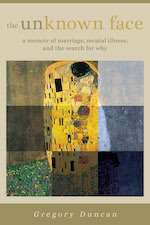Author and musician Gregory Duncan shares his journey from trauma to authorship, including the ups and downs on the way.
Writing can seem like having an illness.
The writer carries around something that mainly they are trying to get rid of, like a bad cough that won’t go away. If they have a story that’s never been told – great! If they can help others by sharing their story – even better!
Until the writer publishes, they will be plagued by ideas and feelings that won’t leave them alone. Countless hours will be spent on theme, syntax and clever plot twists. Rejection from editors, publishers, and critics await them at every corner.
One wonders why a writer would attempt such an endeavor, considering the totality of the effort required. A basic response would be that they have no choice, unless they want to succumb to the illness that is trying to work its way through their very being.
Writing Was a Way Through Difficult Emotional Trauma
The emotional challenges I encountered, besides ones mentioned above, came from grief and trauma.
I started my book less than a year after my wife died by suicide.
I initially wrote so that I would not forget what happened or forget things about her. I wrote in order to preserve something and someone that I thought would be in my life for years to come. I also wrote to make sure her life and purpose carried past her death.
A book that helped me deal with the grief and trauma was “The Body Awareness Workbook for Trauma” by Julie Brown Yau. There were a lot of meditation exercises and self-reflective activities that helped get me to a place of healing.
I also tried craniosacral therapy once and I would definitely recommend it, or any type of body work really. Most importantly, I had the advantage of my two dogs, who provided emotional support and distractions from the stress of daily life.
In fact, the journey I have been on as a writer would not have been possible without them, and so they deserve credit for the book coming to fruition — almost as much as the editors I hired. Each time I plunged into the waters below, they became the flotation devices that helped bring me back to the surface.
Finally, phone conversations with friends and reading books for ideas and inspiration were invaluable in combating emotional challenges and self-doubt. I typically don’t have long, emotional conversations on the phone, and the ones I had after her death were crucial to finding peace.
I Found It Difficult to Channel My Emotions Into My Writing
Despite having coping mechanisms in place, I still was not able to channel my emotions into what I wrote.
On the one hand, I was still in the early stages of processing everything; and on the other, I’m more accustomed to expressing myself through music, since my profession for at least ten years was as a performer for hire.
Writing became the way I processed things on a conscious level, whereas my emotions were confronted in my daily life as they came up, and also through daily music practice.
There were chapters where I described songs because that was the way I could relate emotionally. There were also chapters of the book that I could not revise in the beginning because they were too painful to revisit.
The most challenging and uncomfortable part of the narrative process was recalling and retelling the conversations and moments I shared with Rachel. Turning someone who was recently alive into a character with dialog was therapeutic, but always seemed awkward to read.
Lastly, it was not easy to remember the positive moments and aspects of herself and our relationship due to the way everything ended.

A Writer Has to Fight For His Own Work
My biggest misconception as a novice writer was that I would be finished and published within a year.
When my initial attempts were turned down by agents or publishers, the biggest motivation to continue was rejection itself. I entered the writing world with a cloak of naivety and it forced me back to the drawing board time and time again.
A writer has the sole distinction of standing up for the existence of their story in a world that perhaps cares very little about such things, and the negotiation required to thrust it into the marketplace is rife with pitfalls.
The editor I hired to read the first and twelfth versions of the story advised me to tell the story in a more narrative form, which was not what I wanted to do by the way, since it was originally written as a self-help, mental health book. Based on that advice, I had to learn how to craft a story and re-stitch together the thoughts and feelings from my earlier versions.
How Writing a Book Was Like Creating a Musical Recording
So why write a memoir about mental health and suicide? Why expose such a personal matter in public?
After five years, I finally self-published in order to move on with my life. Each time I went back to work on the book, I felt like I was sucked back in time, and it felt like I couldn’t move forward with my personal relationships.
I also no longer had the patience to hustle agents or wait for the slow grind of the book world to work in my favor.
Whereas I initially wrote to preserve a marriage and process my trauma, I later wrote because I had something to say. The sickness I previously mentioned wouldn’t leave me alone. I suppose there’s also ego-driven reasons and trying to expiate past sins, but it really felt more like trying to reflect something back to the world.
Rachel’s death focused my attention like a laser beam on the events of that summer and what I read and learned after that time period was what I wanted to share. I needed to put our relationship in context and figure out how it related to my life going forward, and how it related to the world that surrounded us.
Overall, it really wasn’t different than putting out a recording, which I’ve done four times previously. The main difference was that I couldn’t artistically describe the events of that summer with music – it had to be put into a story because the experience was too complex and overwhelming.
Is Writing About Emotional Trauma Therapeutic?
People typically ask me if writing the book was therapeutic.
Yes, absolutely.
However, the act of publishing has been detrimental to my overall well-being. The amount of sacrifice in my personal life and musical career has felt enormous. Although it was a conscious choice to write and publish, the book has sucked time away from advancing in my musical career.
I can also admit that I’ve dealt with feeling depressed after publishing due to the fact that people don’t necessarily respond to what you wrote (if they do at all) in the way you think they would. Larger themes are glossed over, moments that required a lot of emotional vulnerability are not mentioned, and people in general have trivial or non-personal reactions.
Unless someone reaches out to you, you have no idea what they think or feel at all.
Maybe letting go and escaping the thoughts and feelings you previously shared in a purge of the soul isn’t complete until the last gasp of a marketing push. Maybe it isn’t worth it until the first moments of professional validation.
Self-Published Books Face an Uphill Battle
If you are a strong individual and good at self-promotion, then self-publishing could work for you.
The majority of self-published books fight an uphill battle however, and the struggle would be easier with representation from a publishing company or public relations firm. For me, using the Promo Stacks and Goodreads Giveaways has helped the most.
It is still a learning process and I’m just at the beginning. It really was never a story I wanted to advertise by myself, but here I am.
Advice for a Young Writer: Read
Since I’m also a musician as well as a writer, sound advice to an aspiring musician would be to listen—listen to the music that you want to perform.
Listening brings ideas and ideas can turn into dreams, or even future music. Study the art and craft of your discipline.
Advice to an aspiring writer is much the same—read. Read the words and stories you want to write yourself. Reading brings ideas and ideas can turn into dreams, or even future stories.
Study the art and craft of your discipline. Finally, if a story should ever erupt in your soul and you find yourself with a sickness that won’t go away, try to cure thyself by writing and maybe, just maybe, the experience will transform not only you, but others as well.
* * *
About the Author
 Gregory Duncan is a writer, musician, and educator, currently living in Philadelphia, after stops in Seattle, Chicago, Texas, Virginia, and Spain. When not taking care of his two compassionate, energetic dogs, he is usually playing the trumpet, reading, or writing. He is currently a member of the Pacific Northwest Writers Association as well as the North Carolina Writers Network.
Gregory Duncan is a writer, musician, and educator, currently living in Philadelphia, after stops in Seattle, Chicago, Texas, Virginia, and Spain. When not taking care of his two compassionate, energetic dogs, he is usually playing the trumpet, reading, or writing. He is currently a member of the Pacific Northwest Writers Association as well as the North Carolina Writers Network.
Duncan has previously published in the online publication “Psych Central” and for the mental health organization NAMI. After twenty years in the music business and touring the world, he has released four jazz recordings, all of which have received radio play throughout the country and the world.
For more information about Gregory and his work, please see his website or Linktr.ee page, and connect with him on Goodreads & Instagram.
Featured image courtesy of Kun Fotografi via Pexels.
 The Unknown Face: A marriage with an imperfect love story goes tragically wrong one summer in a small college town in Virginia, and the husband is left picking up the pieces of pain and regret.
The Unknown Face: A marriage with an imperfect love story goes tragically wrong one summer in a small college town in Virginia, and the husband is left picking up the pieces of pain and regret.
How did it end in suicide instead of divorce?
What he discovers six months later is both heartbreaking and astonishing. In a time when extreme events and behavior are more prevalent, this in-depth psychological account of a seemingly normal relationship describes how things kept hidden underneath provide one’s greatest downfall, and shows what one can learn from loss after the walls come tumbling down.
Available at Amazon, Barnes and Noble and Ingram.
Note: The painting “The Kiss” by Gustav Klimt was Rachel’s favorite and it seemed appropriate for the book cover since the scene is similar to the last moments of her life.

